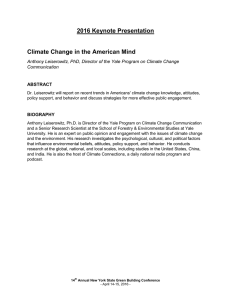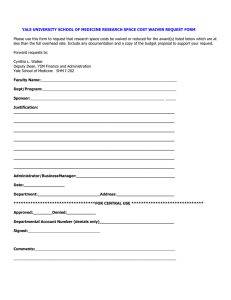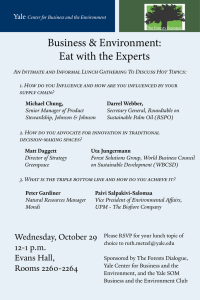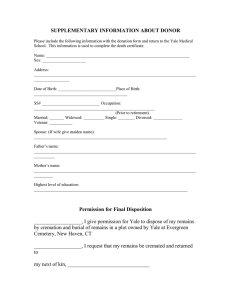Edward Maibach Presentation
advertisement
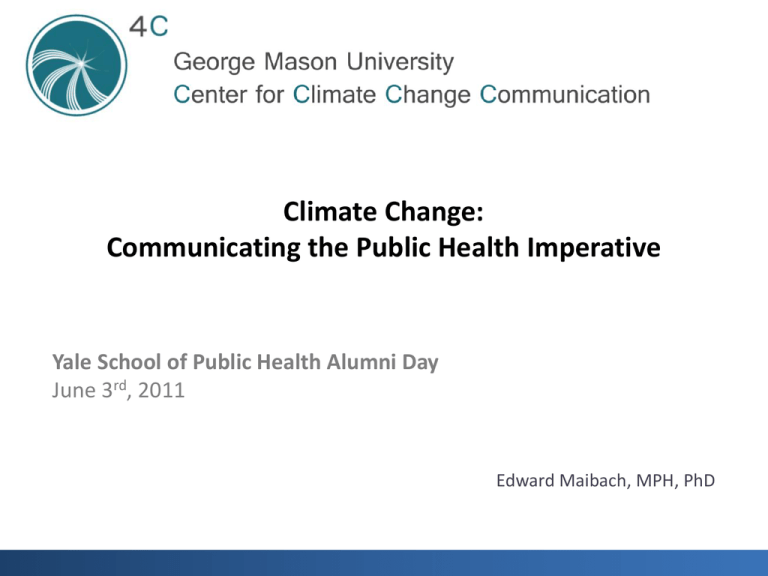
Climate Change:
Communicating the Public Health Imperative
Yale School of Public Health Alumni Day
June 3rd, 2011
Edward Maibach, MPH, PhD
Why should public health agencies be
communicating about climate change?
Three compelling reasons
#1 - Climate change is bad for people.
“We need to… convince the world that humanity
really is the most important species endangered by
climate change.”
—Margaret Chan, MD, Director-General, World
Health Organization
“Climate change is one of the most serious public
health threats facing our nation. Yet few
Americans are aware of the very real
consequences of climate change on the health of
our communities, our families and our children.”
—Georges Benjamin, MD,
Executive Director
American Public Health Association
#2 - Framing climate change as a human health &
wellbeing issue – rather than a plants, penguins &
polar bears issue – can help decision-makers and the
public more effectively engage with the issue.
Framing the issue properly is important because…
...framing is a process by which
we enhance the impact of our
communication by linking our
messages and recommendations
to audience members’ deeply
held values and beliefs.
Americans care more about people – especially children, the
elderly, and other vulnerable members of society – than they
care about “the environment” (i.e., the non-human world).
American Images of Global Warming
Melting
Ice
Anthony.Leiserowitz@yale.edu
Heat
Nature
Ozone Alarmed Flood/ Climate Naysayer
Sea Levels Chg
Source: Leiserowitz, 2003, 2010
Abstract
vs.
Concrete
How can we frame climate change
as a public health issue?
1. By focusing people on a previously unconsidered angle of the
problem that we all care deeply about…our health.
1. By shining a light on the local health impacts of an abstract
global problem, thereby making the problem more concrete.
1. By calling the question of how local adaptation needs will be
met, again making the problem more concrete and actionable.
1. By engaging new voices and partners in the dialogue (e.g.,
pediatricians, health advocacy organizations, PTAs, AARP)
#3 - Many actions taken to deal with climate change
improve our health independent of climate change.
How?
1. Cleaner energy choices cleaner air and water healthier
people.
2. Better community design (active transportation options,
green space, walking trails) more physical activity
reduced obesity, heart disease & cancer.
1. Encouraging produce consumption (instead of meat & highfat dairy) reduced heart disease & cancer.
Instead of this
We get this
Instead of this
We get this
Instead of this
We get this
Instead of this
We get this
Instead of this
We get this
Lower CO2 Emissions
Reduce Urban Heat
Island Effects
Increase Physical Activity
Less Osteoporosis
Fewer Injuries
Lower Air Pollution
Lower Infrastructure
Costs
Increase Social Capital
Less Depression
Increase Happiness
Global Warming’s Six Americas
Source: Yale & George Mason, June 2010
Key messages:
• Climate change is real and human-caused. This is the
consensus of over 95% of the world’s leading experts.
• Climate change is bad for our health in a number of serious
ways.
• We need to start taking actions now to protect the health of
our community’s most vulnerable members – including our
children, our seniors, people with chronic illnesses, and the
poor – because our climate is already changing and our
people are already being harmed.
– {Our top priorities for protecting people’s health from climate change
here are..}
• Taking action creates a “win-win” situation for us because, in
addition to dealing with climate change, most of actions will
also benefit our health in other important ways too.
Global Warming:
Why Public Health Professionals Care,
and Why You Should Too.
[Insert your name here]
[Insert your organization’s name here]
This 30 minute “lunch & learn” style
presentation can be downloaded at:
www.climatechange.gmu.edu
How much do you trust or distrust the following as a
source of information about global warming?
80
70
60
50
40
30
Somewhat
20
Strongly
10
0
May 2011, n=1,010
Source: Yale/George Mason
How much do you trust or distrust the following
as a source of information about global warming?
80
70
60
50
Somewhat
40
Strongly
30
20
10
0
EPA
CDC
DoE
NOAA
NPS
May 2011, n=1,010
Source: Yale/George Mason
